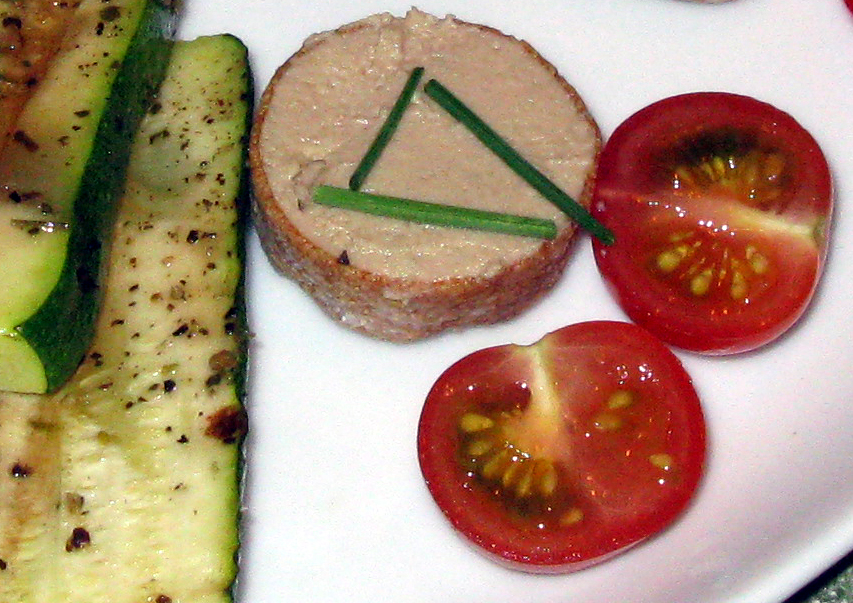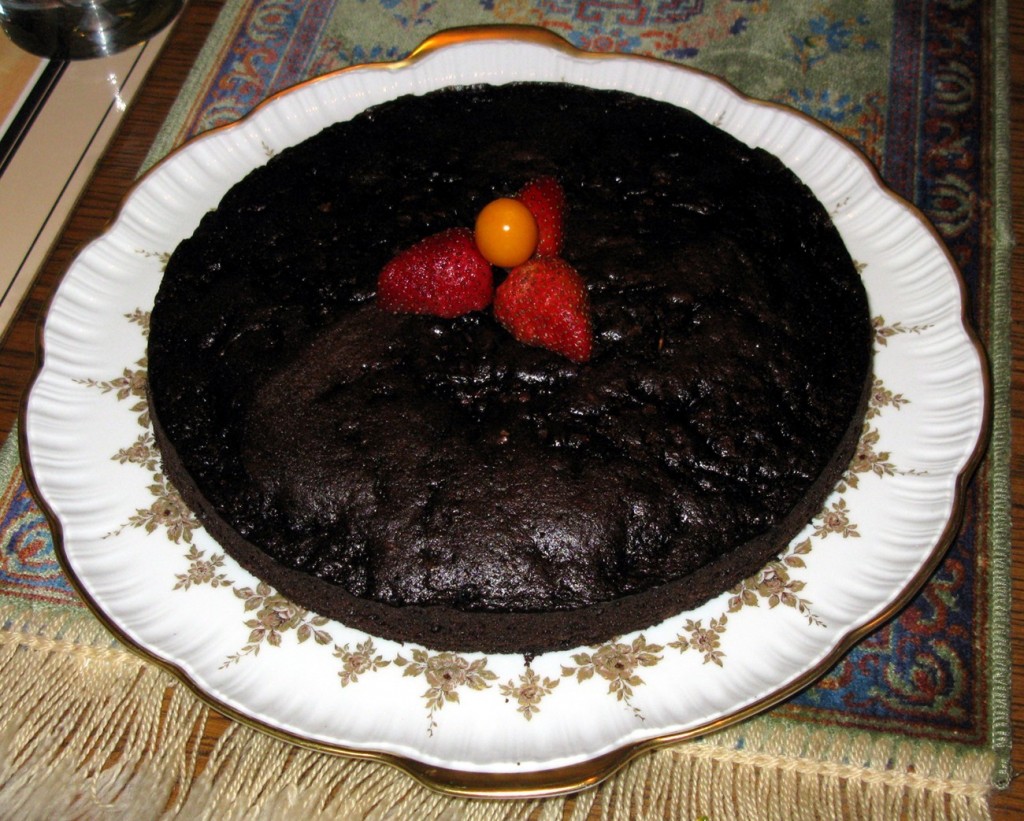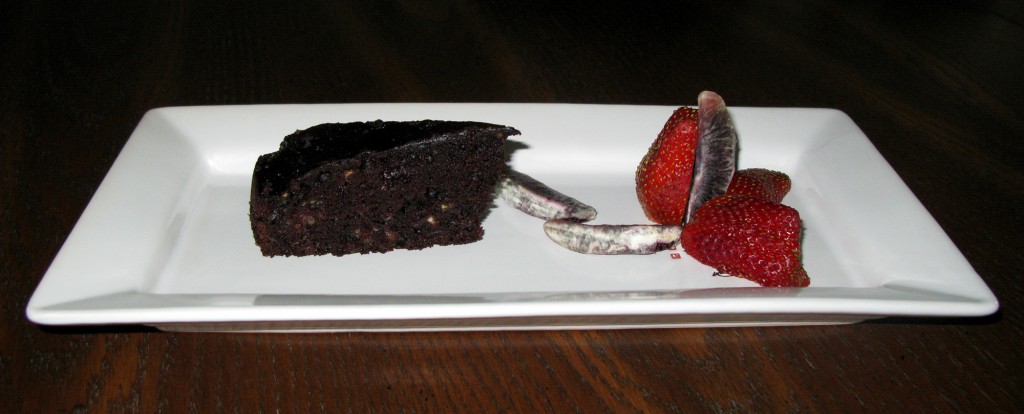Recently a friend of mine asked me what I was planning to do over the weekend. When I answered that I was going to make a mousse de foie de canard from scratch with one of my foodie friends, he gave me an impressed look. Yes, foie gras, that prized and fancy food staple of French haute cuisine which has been recognized as one of the world’s great gastronomic delicacies, is undisputedly a luxury food, joining the ranks of Beluga caviar and white truffles, which represent some of the other sumptuous celebratory foods with a unique mystique. We, more often than not, let masterfully skilled chefs whip up the coveted yet controversial dish. On a number of occasions, I have sampled a variety of different preparations of foie gras, particularly those made from the “fatty” or “fattened” liver of duck, ranging from terrine, pâté, parfait, mousse, and au torchon, to poëllé or pan-seared, roasted, and sautéed, some of the best dishes delivered from the kitchens of some of the finest restaurants in the metropolis of Montreal, including the high-profile restaurant Au Pied de Cochon, the acclaimed bistro-restaurant Laloux, and its sister bar à vin Pop! which I have frequented.
I have in my possession one recipe for the mousse de foie de volaille a generous gift given to me by the great breadmaster, chef, and current creative director of Pop! James MacGuire of “Le Passe-Partout” fame. Instead of leaving it cached as a hidden treasure in my cornucopia of recipes, I decided to put it to good use. My privileged foodie friend and I were quite courageous to undertake such an audacious and ambitious culinary adventure; to intend to make the country-style meat dish is one matter, but to actually execute it successfully is another. But we were both determined to make the mousse de foie de volaille, and on a beautiful, summery evening, we rolled up our sleeves and set out to work in the kitchen.
It was our very first attempt, and we were learning as we prepared the aristocratic delicacy in the kitchen. Although the charcuterie was not executed flawlessly, the dish turned out incredibly well, and we were, overall, quite pleased with our culinary accomplishment. Of course, the fun part of the entire experience was to taste what we had created.
We first sampled the mousse de foie de volaille on its own. Soft pale pink in hue, the duck liver mousse was delicately yet richly flavourful, extremely buttery, and velvety smooth. We then savoured it as a glorious spread on traditional comestibles such as slices of fresh ciabatta, fine rice sesame crackers, and pieces of homemade melba toast, but we also arranged it into crisp, paper-thin croustade shells, the top of the elegant canapés sprinkled with snipped fresh chives. After we grazed on the various foie de canard nibbles and a colourful and varied assortment of grilled vegetables and mushrooms, we were ready to dive deeper into luxurious decadence.
There was to be a sweet course that night, so I returned to the kitchen to prepare a cake which united chocolate with the savoury vegetable zucchini. Baked to perfection, the dreamy dessert, which I made for the first time, turned out to be intensely dark and dangerously decadent. Although the shredded zucchini was thoroughly blended into the cake, the taste of the gourd vegetable in the pastry was not at all apparent. Extremely moist due to the presence of the zucchini and light (but not as light as chiffon cake), the rapturous delicacy, with its pronounced bittersweet dark chocolate flavour, was gently kissed with a subtle hint of spices and dotted with a mix of finely chopped toasted pecans and walnuts. Ravishing in its simplicity, the mouthwatering cake, even without any sugary dressing or crème chantilly topping, was unpretentiously scrumptious. With a few slices of fresh fruit, including ripe strawberries and surprisingly sweet physalis, to accompany the wedges of heaven, the exquisite dessert capped off the meal on a luscious note.
In further pursuit of epicurean enlightenment, I later returned to the remaining surplus of mousse de foie de volaille left over from the dinner and considered other ways to complement and highlight, in an inventive fashion, the taste of this French gourmet treat. I continued to explore the combination of sweet and savoury flavours, as encountered in the chocolate zucchini cake, and based on intuition and instinct, I created two dishes which challenge assumptions, traditions, imagination, and palate.
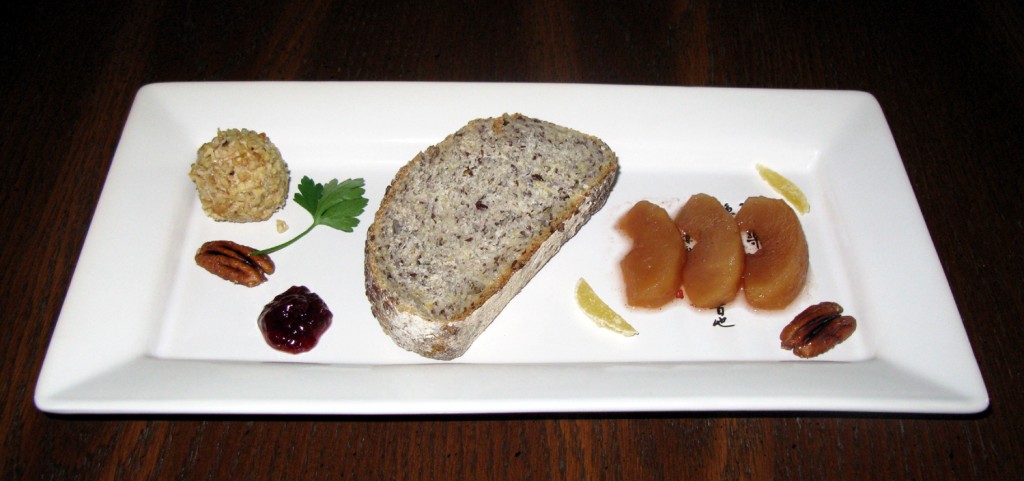
Walnut mousse-de-foie-de-volaille truffle with raspberry jam, country flaxseed bread, poached apple slices, ginger confit, and sugar-glazed pecans
In the first dish, the mousse de foie de canard was shaped into a ball enrobed in coarsely chopped walnuts which were lightly toasted and sugared. Here, the sweetness and the crunchiness of the candied walnuts provided a pleasurable counterpart to the creaminess and richness of the mousse. To lend further complexity to the composition of the dish, the ambrosial and gorgeous-looking truffle was plated with a piece of fresh, warm flaxseed country bread, chilled, tender Delicious apple slices which were poached and infused with spices, a generous dollop of delectable raspberry jam, caramelized toasted pecan halves, slender slivers of ginger confit, and a fresh coriander sprig as an embellishing touch, all of which formed harmonious accompaniments to the walnut foie-de-vollaille truffle. Melded beautifully together in an intricate, balanced interplay of complex flavours, textures, and aromas, the various different elements elevated this refined dish to sophisticated heights.
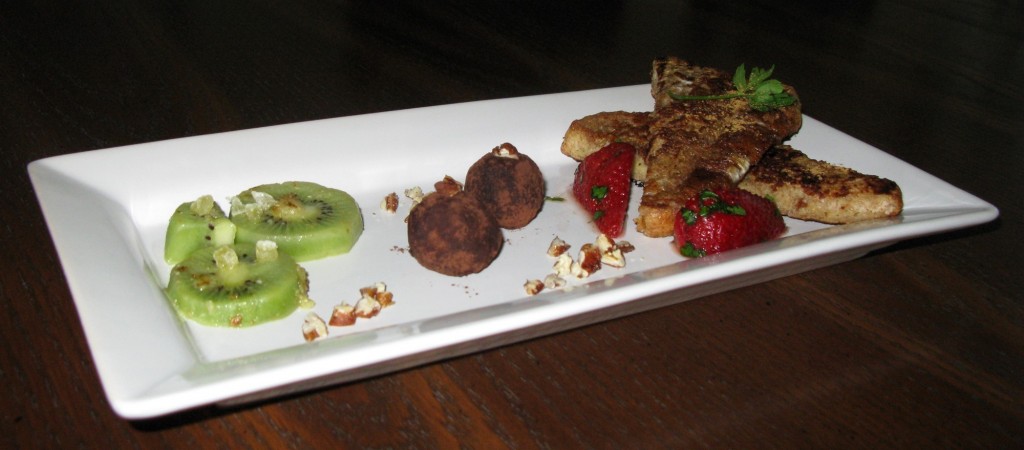
Chocolate mousse-de-foie-de-volaille truffle with spiced pain perdu, marinated strawberry, pan-seared ginger kiwi, and chopped sugared pecans
The second dish, which was composed on a separate day, was more adventurous than the first and revealed an unusual blend of unexpected flavours which worked exceptionally well. The starred feature of this plate was yet another mousse-de-foie-de-volaille truffle, but in this daring variation, the small sphere was dredged in dark cocoa powder and crowned with a tiny chopped piece of sugared pecan. In this disturbingly twisted and mind-blowing rendition of the classic chocolate truffle confection, the dark bittersweet chocolate and the unctuous cognac-laced foie de canard complemented each other blissfully. Alluring and voluptuous, this astonishingly unconventional alliance paired deliciously with the triangles of spiced whole-wheat pain perdu which were dusted lightly with ground cinnamon and garnished with a fresh sprig of cilantro. As tasteful complements to both the homemade French toast and duck liver truffle, the toothsome fruits provided splashes of vibrant colours to the dish, offsetting the prevailing earthy brown tones of the former components. The chilled strawberry quarters were marinated in citrus and pomaceous fruits and spices and speckled with shredded fresh coriander leaves which enlivened the berry in a refreshing and fragrant manner, while the rounds of pan-seared kiwi fruit were delicately caressed with finely grated ginger and dotted sparingly with small pieces of crystallized ginger, the spiciness of the ginger countering gracefully the sweet tartness of the Chinese gooseberry. To complete the plate presentation, a scattering of coarsely chopped sugar-glazed pecan nuts added a whimsical quality to the ensemble of the dish, a striking mélange of sweet, savoury, sour, and spicy elements.
In these two dishes of sensual indulgence, the distinct boundaries between the sweet and savoury worlds have become blurred, and sweet ingredients, such as chocolate, which are normally associated with dessert, are integrated into savoury dishes, and conversely, savoury elements are incorporated into sweet dishes. Of course, the notion of savoury-meets-sweet or the reverse, sweet-meets-savoury, is not novel, for the idea has already been cultivated in a number of culinary cultures which can be traced back in history. But what is old becomes new again, and this sweet-savoury or savoury-sweet concept has become one of the prominent trends in the current evolution of the culinary arts and gastronomy as chefs around the world, in their approach to modern cuisine, find inspiring and innovative ways to startle and tickle the palate. As for my offbeat sweet-savoury concoctions which tickled my fancy, they challenge and defy the classic structure of dishes; in today’s culinary scene, you can have both the sweet and the savoury simultaneously at the beginning, middle, and/or end of a meal. The legendary French pastry chef and chocolatier Jacques Torres once said, “Life is short. Eat dessert first.” Well, he has a point, and I couldn’t agree more with him on this dulcet note.

